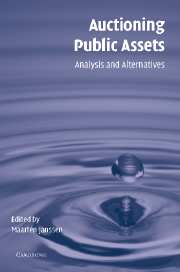Book contents
- Frontmatter
- Contents
- List of figures
- List of tables
- List of contributors
- Preface
- Introduction
- Part I Theory
- Part II Case studies
- 6 Spectrum auctions by the United States Federal Communications Commission
- 7 An analysis of the European 3G licensing process
- 8 Auctions of gas transmission access: the British experience
- 9 The design of Treasury bond auctions: some case studies
- 10 Matching markets
- 11 Competitive procurement of reintegration services in the Netherlands
- 12 The provision of rail services
- Index
- References
8 - Auctions of gas transmission access: the British experience
Published online by Cambridge University Press: 03 December 2009
- Frontmatter
- Contents
- List of figures
- List of tables
- List of contributors
- Preface
- Introduction
- Part I Theory
- Part II Case studies
- 6 Spectrum auctions by the United States Federal Communications Commission
- 7 An analysis of the European 3G licensing process
- 8 Auctions of gas transmission access: the British experience
- 9 The design of Treasury bond auctions: some case studies
- 10 Matching markets
- 11 Competitive procurement of reintegration services in the Netherlands
- 12 The provision of rail services
- Index
- References
Summary
Introduction
An essential component of most utility industries is the network that transfers the commodity (e.g. gas, electrons, data, water) between producers and consumers. Frequently the supply of the commodity cannot meet demand either because of constraints within the network or because of insufficient capacity at points where the commodity is inserted or withdrawn. At these times producers or demand may be rationed. Producers at transport-constrained locations may be replaced by producers at unconstrained locations. Rationing on the demand side can be voluntary, based on price signals or based on interruptible contracts, or it can be involuntary, as occurs during times of rolling blackouts and unanticipated crashes of departmental computer servers. To determine who is rationed first, or, alternatively, who bears the costs of rescheduling production in order to match transmission constraints, we have to identify who owns the rights to the use of the network. Such rights can be implicit, granting unlimited access, explicit, guaranteeing a certain amount of physical delivery, or financial, compensating for costs incurred due to transmission constraints.
The question of transmission rights is of relevance once vertically integrated gas, electricity or water utilities are unbundled such that competing enterprises want to use scarce parts of the network. The successors of previously integrated utilities frequently argue that historic flow patterns guarantee an implicit right to continue similiar use of the transmission network.
- Type
- Chapter
- Information
- Auctioning Public AssetsAnalysis and Alternatives, pp. 197 - 229Publisher: Cambridge University PressPrint publication year: 2004
References
- 5
- Cited by



